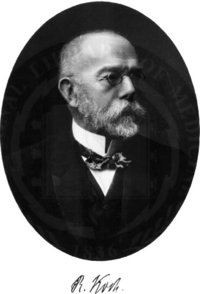Robert Koch
|
|
For the American lobbyist, see Bobby Koch.
Heinrich Hermann Robert Koch (December 11, 1843 – May 27, 1910) was a German physician. He became famous for the discovery of the tubercle bacillus (1882) and the cholera bacillus (1883) and for his development of Koch's postulates. He was awarded the Nobel Prize in Physiology or Medicine in 1905. He is considered one of the founders of bacteriology.
Robert Koch was born in Clausthal, Germany as the son of a mining official. He studied medicine under Jacob Henle at the University of Göttingen and graduated in 1866. He then served in the Franco-Prussian War and later became district medical officer in Wollstein (Wolsztyn). Working with very limited resources, he became one of the founders of bacteriology, the other being Louis Pasteur.
After Casimir Davaine showed the direct transmission of the anthrax bacillus between cows, Koch studied anthrax more closely. He invented methods to purify the bacillus from blood samples and grow pure cultures. He found that, while it could not survive outside a host for long, anthrax built persisting endospores that could last a long time. These endospores, embedded in soil, were the cause of unexplained "spontaneous" outbreaks of anthrax. Koch published his findings in 1876, and was rewarded with a job at the Imperial Health Office in Berlin in 1880.
In Berlin, he improved the methods he used in Wollstein, including staining and purification techniques, and bacterial growth media, including agar plates and the Petri dish (named after J.R. Petri), both of which are still used today. With these techniques, he was able to discover the bacterium causing tuberculosis (Mycobacterium tuberculosis) in 1882 (he announced the discovery on March 24). Tuberculosis was the cause of one in seven deaths in the mid-19th century. The importance of his findings raised Koch to the level of Louis Pasteur in bacteriological research.
In 1883, Koch worked with a French research team in Alexandria, Egypt, studying cholera. Koch identified the vibrio bacterium that caused cholera, though he never managed to prove it in experiments. The bacterium had been previously isolated by Italian anatomist Filippo Pacini in 1854, but his work had been ignored due to the predominance of the miasma theory of disease. Koch was unaware of Pacini's work and made an independent discovery, and his greater preeminence allowed the discovery to be widely spread for the benefit of others. In 1965, however, the bacterium was formally renamed Vibrio cholerae Pacini 1854.
In 1885, he became professor for hygiene at the University of Berlin, and later, in 1891, director of the newly formed Institute of Infectious Diseases, a position which he resigned from in 1904. He started travelling around the world, studying diseases in South Africa, India, and Java.
Probably as important as his work on tuberculosis, for which he was awarded a Nobel Prize, are Koch's postulates, which say that to establish that an organism is the cause of a disease, it must be :
- found in all cases of the disease examined
- prepared and maintained in a pure culture
- capable of producing the original infection, even after several generations in culture
- could be retrieved from an inoculated animal and cultured again.
But after his success the quality of his own research declined (especially with the fiasco over his ineffective TB cure 'tuberculin'), although his pupils using his methods found the organisms responsible for diphtheria, typhoid, pneumonia, gonorrhoea, cerebrospinal meningitis, leprosy, bubonic plague, tetanus, and syphilis among others.
He died in Baden-Baden, Germany.
See Also
bg:Робърт Кох cs:Robert Koch da:Robert Koch de:Robert Koch es:Robert Koch eo:Robert KOCH fr:Robert Koch id:Robert Koch it:Robert Koch he:רוברט קוך ka:კოხი, რობერტ nl:Robert Koch ja:ロベルト・コッホ pl:Robert Koch pt:Robert Koch sv:Robert Koch

